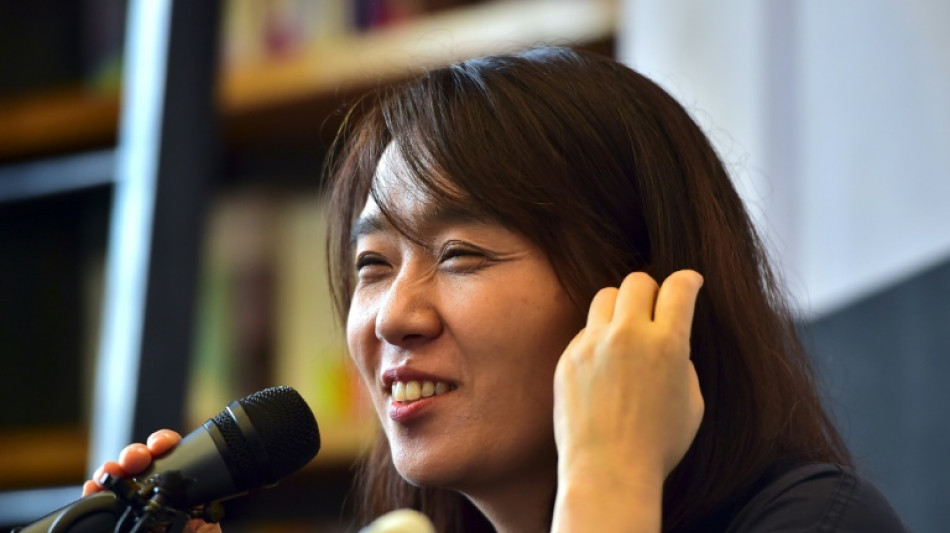
Han Kang wins South Korea's first literature Nobel

Author Han Kang on Thursday became the first South Korean to win the Nobel Prize in Literature for her work exploring the correspondence between mental and physical torment as well as historical events.
A short story writer and novelist, Han is best known for her book "The Vegetarian", which was her major international breakthrough and won the Man Booker Prize in 2016.
Han, 53, was honoured with the Nobel "for her intense poetic prose that confronts historical traumas and exposes the fragility of human life," the Swedish Academy said.
She is one of only 18 women to receive the literature Nobel out of 121 laureates -- though the Academy has made strides in that regard, crowning nine women in the past two decades.
The Academy has long been criticised for the overrepresentation of Western white men authors among its picks.
Han's win surprised prize-watchers, not having featured in the speculation in the run-up to the announcement.
"This is a very rich and complex oeuvre that spans many genres," Academy member Anna-Karin Palm told reporters.
"Han Kang writes this really intense lyrical prose that is both tender and brutal and sometimes slightly surreal," she said.
The daughter of novelist Han Seung-won, she began her career in 1993 by publishing several poems, followed two years later by the short story collection "Love of Yeosu".
Her 2002 novel "Your Cold Hands" reproduces a manuscript left behind by a missing sculptor obsessed with making plaster casts of female bodies, and reflects Han's interest in art.
The Academy described Han's 2010 book "The Wind Blows, Go" as a "complex novel about friendship and artistry, in which grief and a longing for transformation are strongly present".
In 2014, she published the novel "Human Acts", inspired by a massacre carried out by the South Korean military in 1980 and deals with the death of a young boy amid the democratic uprising.
- 'Transform trauma' -
Two years later, she published "The White Book", an elegy to her older sister who passed away hours after being born. It is described by many, including the Academy, as a kind of "secular prayer book".
One of her more recent books, "We Do Not Part" from 2021, is closely connected to "The White Book" in terms of its imagery of pain, the Academy noted.
The story takes place in the shadow of a massacre in the late 1940s on Jeju Island in South Korea, where tens of thousands of people were shot on suspicion of being collaborators.
The book portrays the shared mourning process undertaken by the narrator and her friend, who bear with them the trauma associated with the disaster that has befallen their relatives, the Academy noted.
"Han Kang not only conveys the power of the past over the present, but also, equally powerfully, traces the friends' unyielding attempt to bring to light what has fallen into collective oblivion and transform their trauma into a joint art project," it said.
Commenting on her entire body of work, the Nobel jury highlighted Han's "unique awareness of the connections between body and soul, the living and the dead, and in her poetic and experimental style has become an innovator in contemporary prose."
- Blacklisted over criticism -
In addition to her writing, Han is also a musician and artist, which is reflected in her literary works.
During the presidency of Park Geun-hye from 2013-2017, she was among more than 9,000 artists blacklisted for their criticism of Park's government.
The artists had voiced support for liberal opposition parties, or criticised Park's conservative government and its policy failures, including the botched rescue efforts after the 2014 Sewol ferry sinking in which around 300 people died.
Last year, the literature Nobel went to Norwegian playwright Jon Fosse, whose plays are among the most widely staged of any contemporary playwright in the world.
The Nobel Prize comes with a diploma, a gold medal and a $1 million prize sum.
Han will receive her award from King Carl XVI Gustaf in Stockholm on December 10, the anniversary of the 1896 death of scientist and prize creator Alfred Nobel.
J.Lubrano--PV
